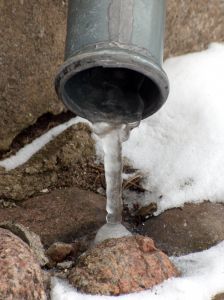 |
Frozen water pipes aren’t life threatening, however frozen or broken water pipes do cause damage to homes each winter. Homeowner need to take steps to avoid freezing damage to their house, inside and outside. For information about steps homeowners need to take to avoid the possible catastrophic losses caused by broken water pipes be sure to read the Blog, Don’t Let Your Pipes Freeze-Tips to Avoid Home Water Damage.
When the pipes in the walls of a house aren’t properly insulated, they can and often do freeze and rupture. Ice expands and needs more space then water and a small amount of water sitting in a cold pipe can require much more space once frozen. This extra space requirement can produce a cracked pipe. As small as an 1/8-inch crack in a pipe can release up to 250 gallons of water a day.
![]() The most important steps to take are prevention measures. Routine winterizing steps should be done every year, as outlined in the Blog: Don’t Let Your Pipes Freeze-Tips to Avoid Home Water Damage. But, there is more homeowners can do when the cold weather hits. If you are dealing with freezing cold temperatures be sure to take these additional steps until normal temperatures return:
The most important steps to take are prevention measures. Routine winterizing steps should be done every year, as outlined in the Blog: Don’t Let Your Pipes Freeze-Tips to Avoid Home Water Damage. But, there is more homeowners can do when the cold weather hits. If you are dealing with freezing cold temperatures be sure to take these additional steps until normal temperatures return:
- Open cabinet doors under your kitchen and bathroom sinks and basins, to allow the heat inside of your house to keep the uninsulated pipes warmer.
- Turn on water faucets and allow hot and cold-water to trickle at night from sinks inside your home, especially those located on an exterior wall.
- If your laundry washer is kept in the basement or garage, be sure to empty the contents before going to bed at night to avoid freezing the inside of the wash machine. It’s also a good idea to remove the hose drain line from the pipe leading out of the house. I once lost a new washer to a freeze and damaged the drainpipe.
- Remember to keep your thermostat set to at least 55 degrees if you plan to leave your home for any amount of time during the day or to go on vacation.
 |
![]() If your pipes Freeze:
If your pipes Freeze:
- Make sure you and your family members know how to shut off the water, in case pipes burst. Stopping the flow of water can minimize the damage to your home.
- Never try to thaw a pipe with an open flame or torch.
- Always be careful of the potential for electric shock in and around standing water.
- If your area is prone to freeze keep a pipe clamp on hand. Homeowners can also buy quick-repair, screw-on devices at a hardware store. When all else fails homeowners can make a handmade pipe clamp by wrapping the burst section with a strip of rubber, such as a bike inner tube. Then clamp the wrap with an adjustable hose clamp, a pipe sleeve clamp, or a C-clamp.
- Call a plumber to repair or replace the damaged section of pipe as soon as possible. Even if you plan to report the loss to your homeowner insurance, it’s your responsibility to mitigate the damages and prevent a larger loss. Stop leak, to prevent more damage then report your claim.
- If your home does have water damage, or flooding due to a broken pipe be sure to further mitigate your losses and call to have the water removed from your carpets and floors. In many areas, there are businesses that specialize in emergency services by quickly responding to water damage. In many cases, they can remove the water and set up heat dryers in a wet house to avoid the development of mold and catastrophic structural damage that often occurs when buildings are soaked.
No matter what time of the day or night, holiday or weekend, if your home suffers water damage from a broken pipe be sure to call your insurance agent or company and report the loss. If your insurance company doesn’t provide 24-hour claims services leave a message on voice mail and take actions to prevent more serious damage immediately.
![]() Related Blogs:
Related Blogs:
- Don’t Let Your Pipes Freeze-Tips to Avoid Home Water Damage.
- How To Have a Claim Free Holiday Season
- Household Inventory–Getting Started
Photo credits for this blog entry:  (no use restrictions for these photos)
(no use restrictions for these photos)
Glossary of Insurance Terms:
A | B | C | D | E | F | G | H | I | J-K | L | M | N | O | P | Q-R | S | T | U-V | W-Z
Families.com Blogs are for informational purposes only. Families.com assumes no responsibility for consumer choices. Consumers are reminded that it is their responsibility to research their choices properly and speak to a certified insurance professional prior to making any decision as important as an insurance purchase.

